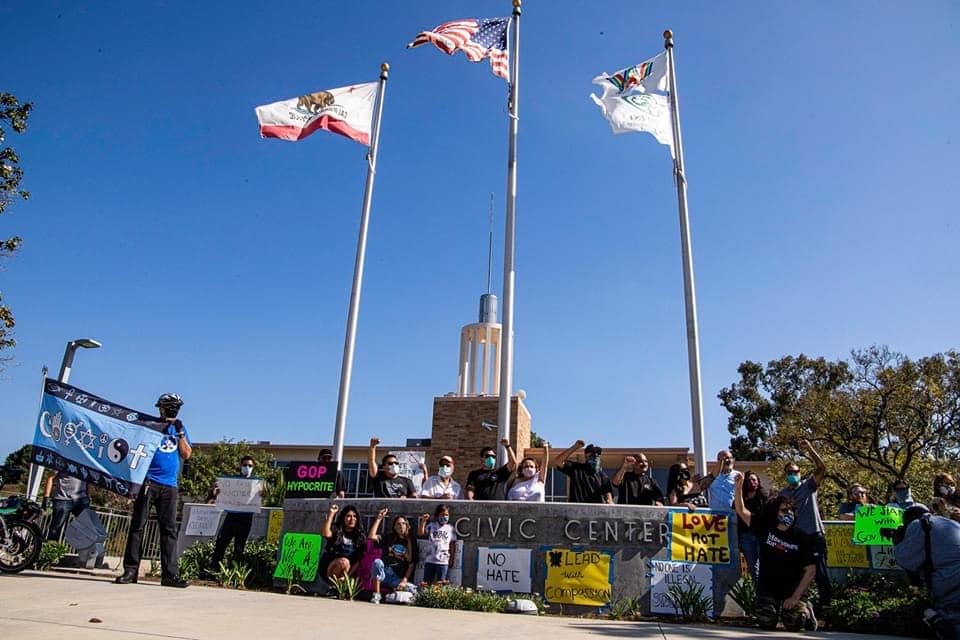[dropcap size=big]O[/dropcap]n Sunday, hundreds of Whittier locals gathered last-minute in Uptown to march for justice George Floyd and to support Black Lives Matter. Two days later, on Black Tuesday for hundreds more filled Whittier’s Central Park and marched down the tree-lined streets through the scenic business district to City Hall and the police station.
The peaceful protestors shouted hard, their cries of “I can’t breathe!” “No justice, no peace!” and “Black Lives Matter!” rang out in the otherwise quiet streets of Uptown Whittier, a historically conservative city that hosted its first Pride festival just last Fall.
It’s a big deal for Whittier to see such unprecedented numbers of locals take to its pretty tree-lined streets to demand an end to the racist police state and to specifically address anti-Black racism. At least two more Whittier protests are planned for this week, each planned by different organizers who range from graduating La Serna and area high school students to local politicians running for state and city offices.
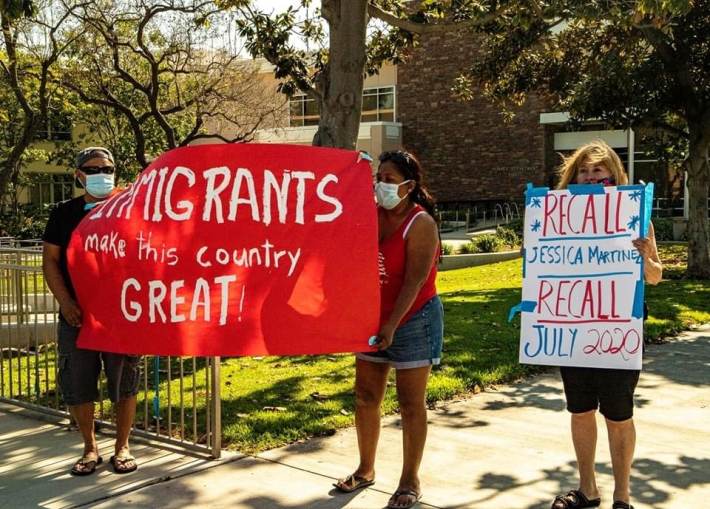
These organizers, as well as the hundreds of young people and some elders, represent a shift in Whittier’s political climate. In the time of Trump and with Nixon a dot in the rearview mirror, a new generation of young, fierce activists call for compassionate, community-based progressive change in the historically conservative city.
To protest in a pandemic
Days after Governor Gavin Newsom announced he would provide $75 million of emergency pandemic relief aid to immigrant and undocumented populations in California, Whittier City Councilwoman Jessica Martinez filed a lawsuit against him.
The first Latina to be elected to the city council and a Republican running for Democrat Ian Calderon’s California Assembly District 57 seat, Martinez and her co-plaintiff sought to bar Newsom from distributing the much-needed cash aid to these predominantly Latino and immigrant communities. Doing so, she claims, would be “unconstitutional” and therefore, illegal.
“Fighting for someone you don’t know is exactly what we need right now. It’s exactly what we need.”
When Whittier resident and community advocate Yaz Ferrada found out about Martinez’s lawsuit, she knew she wanted to plan a demonstration against the city councilwoman’s action and the MAGA movida it represents. But, “We’re living under COVID-19 times and a stay-at-home order right now, so organizing and mobilizing looks very different,” said Ferrada. “How do we organize while still staying socially distant?”
Caravans.
Up and down the state, people have taken to their cars in caravans to gather in a physically distanced way, whether for birthday celebrations or political actions of all ideological stripes. Liberty-or-die lockdown protesters rolled through downtown L.A. to call for the “reopening” of California and the economy, while up north, anti-ICE demonstrators drove through San Francisco and Sacramento to demand the release of immigrant detainees, a high-risk group for contracting the virus.
To protest Martinez’s actions, to call for her recusal from the Whittier city council, and to show solidarity with the immigrant and undocumented workers who would benefit from Newsom’s plan, Ferrada and other concerned residents turned to a familiar cultural practice that runs deep in the greater East L.A. community: cruising.
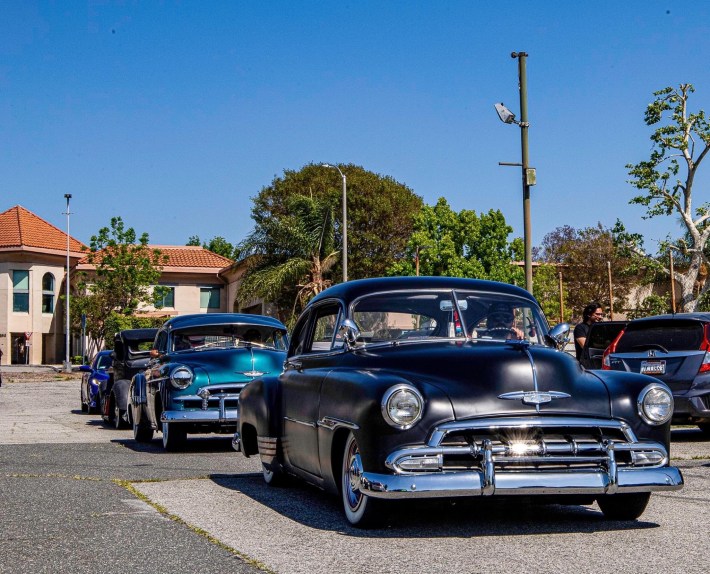
Held on the Sunday before Cinco de Mayo, Whittier’s Cruise for Compassion met its immediate goals: to publicly denounce Councilwoman Martinez’s Trumpian politics, urge her to show compassion for community members during this public health emergency, and stand in solidarity with the immigrants and undocumented essential workers across the state—the vast majority of whom are Latino service workers—targeted by her lawsuit.
More significantly for Ferrada, whose own recent bid for a seat on the Whittier City Council was inspired by AOC, the Cruise for Compassion revealed another story: There’s a new generation of civic activism that seeks community involvement and political progress in Whittier, changing the narrative of whitewashed and aspirational conservative politics as usual in this old Nixon town.
What we’ve always done here
On the Sunday before Cinco de Mayo, dozens of cars gathered in the Whittier High School parking lot to stage a Cruise for Compassion. Demonstrators drove vintage lowrider Chevys, big SUVs, tidy hybrids, and Honda Civics through Martinez’s district in Whittier. They culminated in a gathering in front of City Hall to recall Martinez in July and defeat her run for the California State Assembly in November.
Cruising, most often associated with “lowriding,” has long been a cultural expression associated with urban Brown and Black communities throughout Los Angeles. As la profesora Dra. Denise Sandoval “the Lowrider Scholar” teaches us, such collective practices are rooted in shared histories of struggles and can lead to “interconnection, the creation of multicultural spaces, [and] bridge gaps” between communities.
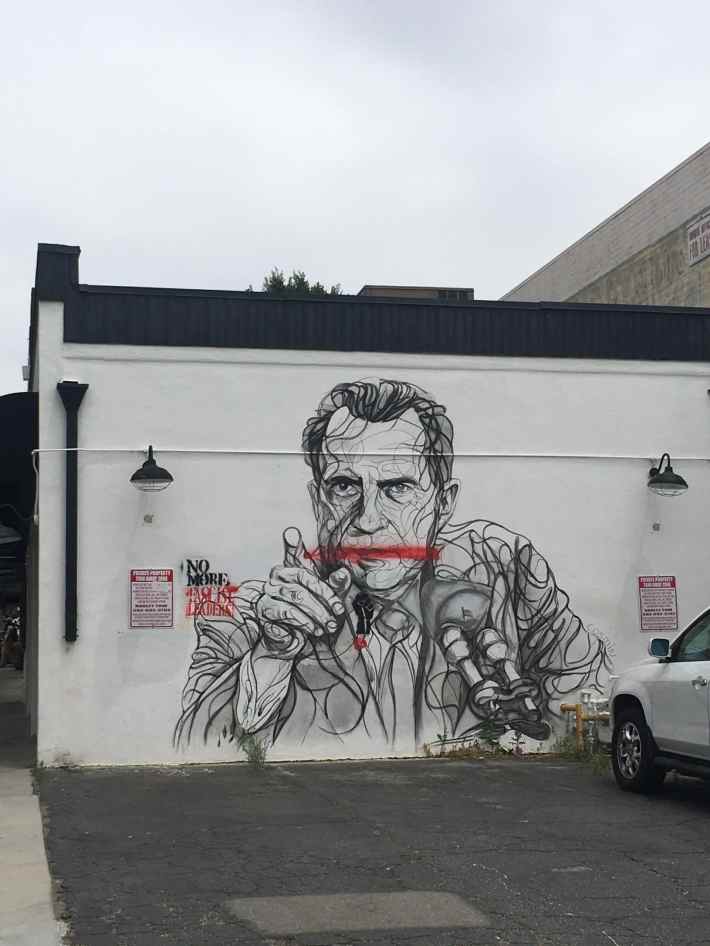
Intergenerational interconnection is especially important in building solidarity between second, third, fourth, even fifth generation Chicanas and Chicano and Latinas and Latinos and newer immigrants. Ferrada recognizes the importance of building cross-generational bridges through familiar and meaningful cultural practices.
“Our community has always ‘cruised’ in this area,” Ferrada told L.A. Taco. “It’s such a beautiful part of our culture and community.”
As a second, third, fourth, even fifth-generation practice, cruising is also an effective way to make a political statement that appeals to gente and displays solidarity against anti-immigrant politics.
The Cruise demonstrated the promise of an intergenerational political awakening in the local Latinamerican community...
In planning the Cruise for Compassion, Ferrada described the importance of including as many community members as possible in and around Whittier. “We wanted to be intentional about inviting folks who may not usually participate in demonstrations or be politically active, and welcome those to drive by and display their discontent for what [Martinez] stands for,” Ferrada explained.
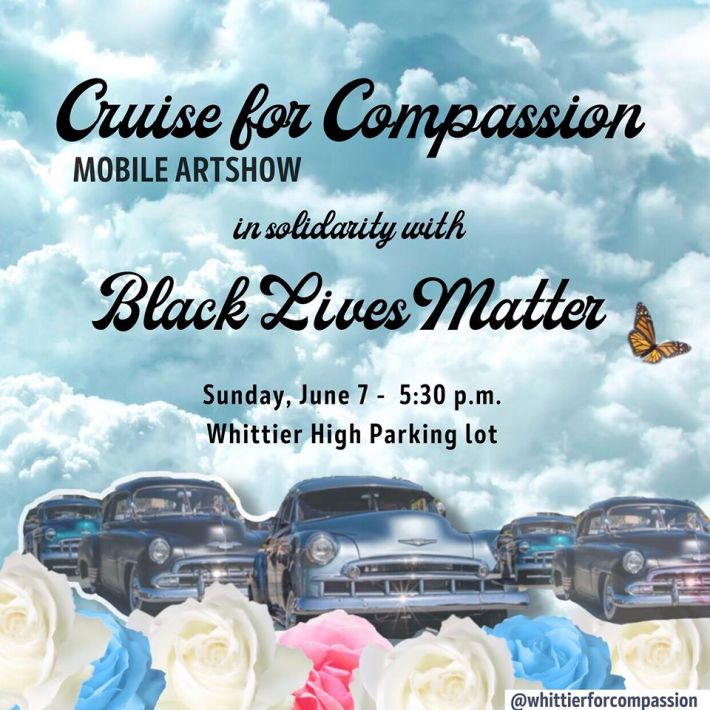
And cruisers did. They drove by with hand-lettered signs that declared “No hate, bigotry, racism in Whittier,” and “Recall Jessica Martinez July 2020.” They will do it again on June 7, when Ferrada’s Cruise for Compassion will host a mobile art show in solidarity with Black Lives Matter.
“What a great way to do this during a pandemic,” said co-organizer and Whittier resident, Apolonio Morales, who started a Change.org petition calling for Martinez’s recusal from the Whittier City Council.
In the petition, Morales writes, “Immigrants need to be included in relief efforts to restart our local economy. We take the wellbeing of all of our Whittier community very seriously and for this reason we are asking you to recuse yourself from this misguided and shameless effort to scapegoat immigrants.”
For Morales, the Cruise demonstrated the promise of an intergenerational political awakening in the local Latinamerican community, as well as a call for compassionate leadership from the councilwoman—and all elected officials who support legislation against immigrants and other marginalized groups—during this emergency.
“There are transgender folks in our community, there are homeless folks, immigrants, everyone under the sun living here,” said Morales about Whittier and the greater California Assembly District 57, which Martinez seeks to represent in November. “There are a whole bunch of young folks who want to build community and do it with love, take care of one another, and do it with inclusivity. We can’t alienate the young folks with these old school ways.”
Bigger than the lawsuit, beyond Whittier
These “old school” ways Morales refers to include the ideas that Mexicans and other Latinos must assimilate to the dominant Anglo American national culture. The old bootstrap ideology that values aspirational, privatized individualism over more collective, community-based ways of living seeps deep into the immigrant imperative to assimilate.
“There’s this assumption that Whittier was always very whitewashed and conservative,” said Ferrada, pointing to the town’s Quaker history, its fabled connection to President Richard M. Nixon—whose face appears on a newly-tagged mural in Uptown—and its proximity to Orange County.
For years, there were more registered Republicans than Democrats. The political mood in Whittier shifted during the Bill Clinton Administration and saw more voters register as Democrats. Today, registered Democrats still outnumber Republicans 2-1 in Whittier, a majority (68 percent) “Hispanic/Latino” city of around 86,000 where the average household income is $102, 907.
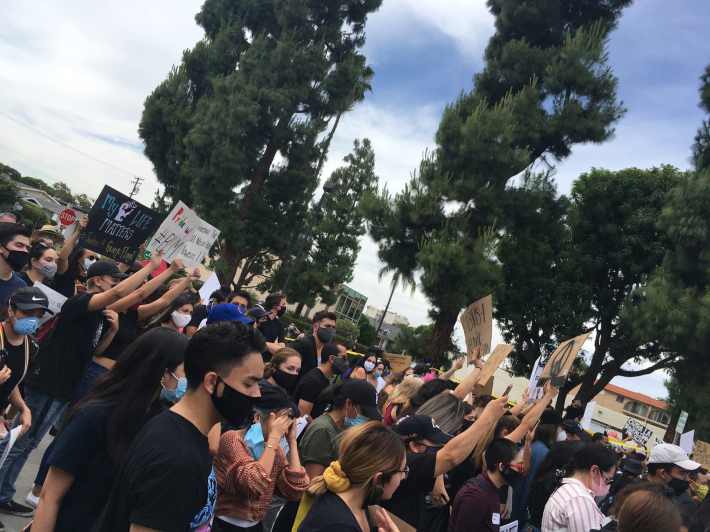
Such demographics suggest that a lot of middle-class Latinx live, work, and play in Whittier. Those who find themselves in positions of power tend to lean more towards the law-and-order status quo than the progressive end of the spectrum. For example, two years ago, some Latino city leaders wanted to ban taco trucks from the Uptown business district. This prompted the L.A. Times’ Gustavo Arellano to write about Whittier as a “case-study” for how well Latinos “thrive” and “assimilate” in this country—but not in a complimentary way.
“Few things are more American than pulling up the ladder behind you,” Arellano wrote.
We can look to other examples, like the Trump-supporting owner of the mariachi restaurant Cielito Lindo in South El Monte, also in District 57. Morales poses another set of questions. “Why do we have Cielito Lindo trying to sue the state to reopen businesses? Why you have the Latinos and Salvadorans as the faces of this lawsuit? It seems the GOP is trying to diversify its party, but the entry ticket is that you have to hate the people from where you come from.”
“Even if you’ve ‘made it’ and achieved the American Dream, you’re still seen by the majority of white people as an immigrant. We’re not that far removed from that experience, from our parents’ or grandparents’ struggles, and we can’t turn our back on them and the immigrants who put food on our tables.”
This is how we get Republican Latin politicians like Jessica Martinez and her co-plaintiff, Ricardo Benitez—a formerly undocumented Salvadoran and Republican running for California State Assembly District 39, which covers north San Fernando Valley—suing the governor over immigrant aid through the Center for American Liberty, headed by a Republican party official in the time of Trump. Martinez’s election not only brings a Republican majority back to the Whittier city council, but a specifically anti-immigrant political agenda disguised as concern for the constitutionality of what the governor does with public funds during a pandemic emergency.
Morales points out that the California Supreme Court did the right thing on May 6 by rejecting the emergency petition filed by Martinez and Benitez. “The Supreme Court saw [the lawsuit] as the nonsense it is and allowed the program to continue because it falls under the purview and power of the governor to provide for all people in California during a disaster,” he explained.
Still, Martinez’s election was a spark for Morales, Ferrada, and others in the community to organize and plug into a different narrative of what a new generation of Latinx politics could look like, inspired by inclusivity, compassion, and a collective move towards more progressive aims in Whittier and the greater San Gabriel Valley.
“We have to look at the bigger picture,” says Morales. “Even if you’ve ‘made it’ and achieved the American Dream, you’re still seen by the majority of white people as an immigrant. We’re not that far removed from that experience, from our parents’ or grandparents’ struggles, and we can’t turn our back on them and the immigrants who put food on our tables.”
Connecting the dots and raising consciousness
Ferrada, who knocked on doors and talked to neighbors during her campaign, sees the compassionately progressive potential of Whittier and all of district 57. “Folks here want to know there’s another option besides the same two or three names they always see on the ballot,” she said.
Mobilizing the District 57 Latinx community will take effort and a variety of approaches. “Our community, our culture, is not a monolith,” said Ferrada.
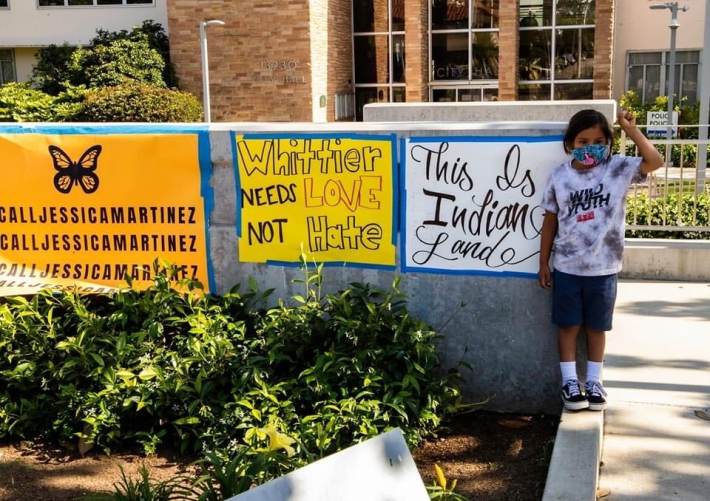
“There are so many layers that make our culture beautiful and provide us with many avenues to reach our people, organize, and demonstrate, like the Mother’s Day vigil we had the weekend after the cruise,” Ferrada continued. “This is not just about Martinez, that lawsuit, or her candidacy for the state assembly. We’re trying to connect with each other and build a sustainable, intergenerational movement to move us all forward as a community.”
The call for intergenerational connections was echoed by a Vietnam Veteran who attended Sunday’s march for George Floyd in Whittier. The Veteran spoke to the protesters gathered quietly on the lawn. “I’m ashamed that I don’t see enough of my generation here,” said the Vet. He shared his own stories of returning from the war after serving his country, only to be subjected to racist treatment by the cops at home. He then reminded the younger folks in the crowd that the problems he’s seen continue today. “We all should be out here,” he expressed.
Michael Tolar agreed. “We can’t just leave everything up to the young people,” said Tolar, a Puerto Rican resident of Whittier and “big Bernie supporter.” Tolar is a progressive Democrat running to unseat Linda Sánchez’s seat in the U.S. Congress, and the “biggest hurdle” he says about campaigning is reaching the older generation in the area.
Tolar grew up in South Gate before moving to Santa Fe Springs and then Whittier, so Tolar understands intimately the need to educate Latinx people about anti-Black racism. “Black and brown should come together,” he said, pointing out that the racist system that puts migrant kids in cages at the border are the same that killed Floyd, Michael Brown, and Breonna Taylor.
“Yes, all lives matter,” said Tolar, “but not all lives have to worry about having a knee on their neck.” He told L.A. Taco that he decided to organize this weekend’s protest in Whittier because it was important to be out there not only as a community member, but as a politician. “Fighting for someone you don’t know is exactly what we need right now. It’s exactly what we need.”
